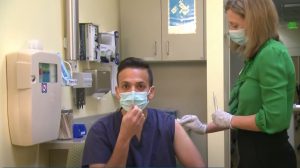NEW YORK (Reuters Health) – While contact isolation precautions are recommended for all patients colonized or infected with vancomycin-resistant enterococci (VRE), a European study shows that isolation is unnecessary for those with VRE of genotype vanC.
Dr. Andreas F. Widmer at University Hospital Basel, Switzerland; and colleagues note that most outbreaks of VRE have been caused by genotypes vanA and vanB, in which the resistance genes are carried on plasmids and are therefore transmissible. By contrast, resistance genes in genotype vanC VRE are encoded chromosomally and this type has only rarely been linked to outbreaks.
For this reason, guidelines that recommend isolation of all VRE cases are often not followed in Europe in cases of VRE of genotype vanC, which is common there, the authors explain in the September 15 issue of Clinical Infectious Diseases published online August 4.
To estimate the risk of invasive disease in carriers of VRE vanC and the level of transmissibility, Dr. Widmer and colleagues studied data on leukemia patients undergoing stem cell transplants where only standard precautions were taken when a patient tested positive for VRE vanC.
Routine screening swabs identified 290 isolates of VRE of genotype vanC from 273 patients.




